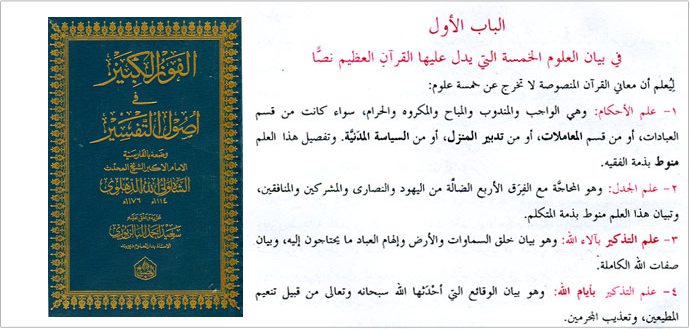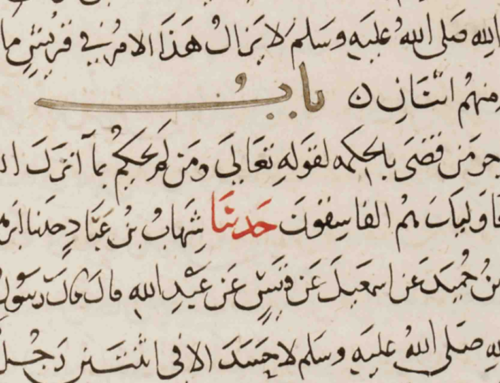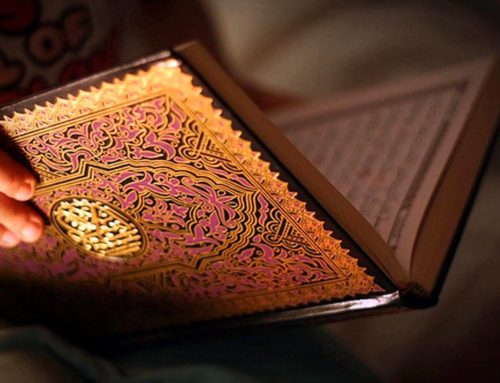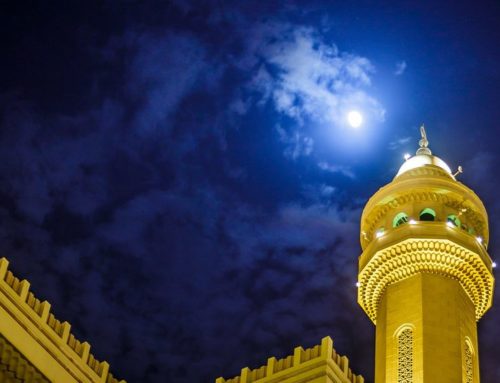Translated by Zameelur Rahman
Shirk is to affirm the special attributes of Allah (Exalted is He) for [those] besides Him, like:
(1) affirming absolute disposal (al-tasarruf al-mutlaq) in the cosmos (kawn) by an absolute will (al-iradah al-mutlaqah), which is expressed as “kun fayakun” (Be! And it is); (2) or affirming intrinsic knowledge (al-‘ilm al-dhati) which has not been obtained through acquisition (iktisab) by means of the senses, rational proof, dreams (manam), inspiration (ilham) and their likes from [both] material and spiritual means; (3) or affirming [the act of] existentialising (ijad) the healing of a sick person; (4) or affirming a curse on an individual or displeasure upon him such that the object of this curse becomes penniless, sick or wretched; or [affirming] mercy and satisfaction with an individual, such that he becomes by means of this mercy and pleasure, rich, healthy, fit and happy.
These [pre-Islamic] mushrikun did not recognise a partner (sharik) besides Allah (Exalted is He) in the creation of substances (jawahir), i.e. the foundations of matter, and administration of cosmic affairs. They recognised that none had the power, when Allah (Exalted is He) had established and decreed a thing, to impede or stop Him.
Their association (ishrak) was only in specific matters with [respect to] some servants [of Allah], since they believed that just as a great sultan from amongst the great sultans dispatches his servant and his close companions to one of the corners of his kingdom to take charge of one of the particular affairs and he makes them freely-dispose (mutasarrifin) therein by their choice and authority until another decision issues from him, and he does not take charge of the affairs of [his] subjects and their particular affairs himself, rather he delegates this to his authorities (wulat) and rulers (hukkam) and he accepts from them their intercession and their commendation of the employees that are working under their watch and those connected to them and those close to them, similarly the Absolute King of Kings (Exalted is His Eminence) has indeed conferred the robe of divinity to some of His close servants, and He made their displeasure and pleasure effective for His other servants.
As a result of this, they would believe it necessary to come close to these servants that were brought close [to Allah], until this became a means of the validity of being accepted in the presence of the True King; and [they believed] their intercession with respect to them would obtain privilege and acceptance from Him (Glorified is He) when deeds are recompensed and accounted.
Considering this perception and conception which was firmly-rooted in their minds, their minds incited them to prostrate before them and slaughter on their behalf, and take oaths upon their names and seek help (isti’anah) [1]Shah Waliullah Dahlawi wrote on this issue: “All who go to the land of Ajmer or to the grave of Salar Mas’ud or those that resemble them in order to request [to fulfil] a need, it is … Continue reading by their absolute power, and carve their images and their statues from stone, brass, copper etc. and make them a Qiblah (direction of worship) in order to turn to their spirits; and the ignorant gradually advanced in this manner until they began to worship these images and statues and believed them to be gods (alihah) themselves, and confusion, doubt and great corruption occurred in their beliefs. [2]After explaining further the condition of the mushrikun, Shah Waliullah compares them with some Muslims of his time. He writes: “If you, dear reader, are hesitant in accepting the accuracy of … Continue reading
(Al-Fawz al-Kabir fi Usul al-Tafsir, translated into Arabic by Salman al-Husayni al-Nadwi, pp. 23-25, Dar al-Basha’ir al-Islamiyyah, Third Edition)
| ↑1 | Shah Waliullah Dahlawi wrote on this issue: “All who go to the land of Ajmer or to the grave of Salar Mas’ud or those that resemble them in order to request [to fulfil] a need, it is indeed a sin more grievous than murder and adultery. Its likeness is not but the likeness of those who worship the creation or like those who call on Al-Lat and Al-‘Uzza. However, we do not [unequivocally] declare disbelief [upon them] due to the absence of a text from the Lawgiver in this specific matter. All who assign life to the dead and request their needs from them, ‘his heart is surely sinful’ (Qur’an, 2:283), and [this act] is included in His statement (Exalted is He), ‘that is iniquity’ (Qur’an, 5:3).” (Al-Tafhimat al-Ilahiyyah, 2:45)
In the same work, he writes: “The definition of associating (shirk) [partners] with Allah (Glorified is He) in worship is glorifying (ta’zim) other than Allah, intending thereby to come closer to Allah (Exalted is He) and salvation in the Final Abode. One of the greatest diseases in this age of ours is their worship of their shuyukh when [they are] alive or [worship] of their graves when [they are] dead. The ignorant [Muslims] imitate the disbelievers of India [i.e. Hindus] in worshipping their idols [which is] amongst their [ritual] acts. The definition of associating [partners] with Allah in seeking help (isti’anah) is to seek one’s need from another while believing he has the power to accomplish it by applying [his] powerful will (sarf al-iradah al-nafidhah), like curing the sick, giving life and death, giving provision and creating a child, and other things that are contained in the Names of Allah (Exalted is He). The definition of associating [partners] with Allah in supplication (du’a) is to mention other than Allah (Glorified is He) while believing this action of his will benefit him in his afterlife or in coming closer to Allah, just as they mention their shuyukh when waking up in the morning.” (Al-Tafhimat al-Ilahiyyah, 2:64) He also discusses isti’anah in relation to shirk in his masterpiece, Hujjat Allah al-Balighah: “This concept [i.e. shirk] has various embodiments and forms, and the divine law only discusses embodiments and forms of it which the people practice with the intention of shrik, so that they become anticipated sources (mazinnah) of shirk and customarily inseparable from it. This is similar to the practice of the divine law in establishing the causes that entail good or evil actions as being tantamount to those acts themselves. We want to alert you to those things which God, may He be Exalted, has made anticipated sources (mazinnat) of shirk in the divine law brought by Muhammad, may there be peace and blessings upon the one who brought it, so that he forbade them…2) Among them is that they used to request assistance (yasta’inuna) with their needs (fi hawa’ijihim) such as in curing the sick and meeting the needs of the poor, from other than God. They would make vows to them expecting the accomplishment of their purposes through these vows, and they would recite their names, hoping for their blessing. Therefore, God, may He be Exalted, made incumbent upon them that they say during their prayers: ‘Thee alone do we worship, Thee alone do we seek for help’ (Qur’an, 1:4). And He said, may He be Exalted, ‘Call upon no one except God’ (Qur’an, 72:18). The meaning of ‘calling upon’ is not worship as certain of the interpreters of the Qur’an said, it rather means ‘seeking help’ (isti’anah) according to the saying of God, may He be Exalted, ‘No, but you call upon Him and He removes the thing because of which you call upon Him’ (Qur’an, 6:41).” (The Conclusive Argument of God: Shah Wali Allah of Delhi’s Hujjat Allah al-Balighah, Trans. Marcia K. Hermansen, p.184-6) |
|---|---|
| ↑2 | After explaining further the condition of the mushrikun, Shah Waliullah compares them with some Muslims of his time. He writes: “If you, dear reader, are hesitant in accepting the accuracy of what was said about the beliefs of the mushrikin and their deeds, look at the superstitious distorters of this age, especially those of them who reside in the borders of the Abode of Islam [i.e. India], what their conceptions of “sainthood” (wilayah) are; for, despite recognising the sainthood of the early saints, they believe the existence of saints in this age is impossible, and they attend the graves and holy places [of the early saints] and are afflicted by all kinds of shirk, bid’ahs and superstitions; and distortion (tahrif) and assimilation (tashbih) have taken root in them and penetrated into their minds until no tribulation amongst the tribulations and no trial amongst the trials contained in the judgement that has come in the authentic hadith, ‘You will surely follow the ways of those who went before you…’ remained but a group from amongst the groups that are Muslims by name plunged into it and became attached to it. Allah (Glorified is He) save us from that.” (Al-Fawz al-Kabir, p.26)
He wrote elsewhere: “Allah’s Messenger (Allah bless him and grant him peace) said, ‘You will surely follow the ways of those who went before you, hand span for hand span, arm’s length for arm’s length, until if they were to enter the hole of a lizard, you would follow them.’ We said, ‘O Messenger of Allah! The Jews and Christians?’ He said, ‘Then who?’ Al-Bukhari and Muslim transmitted it. Allah’s Messenger (Allah bless him and grant him peace) spoke the truth for indeed we have seen men amongst the feeble of the Muslims taking the pious as lords besides Allah and adopting their graves as mosques just as the Jews and Christians would do.” (Al-Tafhimat al-Ilahiyyah, 2:134-5) |







The book ‘Al-Fawz al-Kabir fi Usul al-Tafsir'(The Principles of Qur’an Commentary) by this Great Scholar Hazrat Shah Waliyullah Muhaddis Dehlawi(Quddisa Sirrahu) is available in English, as translated by Prof.G.N. Jalbani ,Ex.Professor,University of Sind, at the link below.It is useful for all those interested in the philosophy of this eminent scholar.
“Al-Fauz Al-Kabir Fi-Usul Al-Tafsir is among Shah Waliyullah’s important works and presumbly the best compilation ever prepared on the subject. The author’s approach to the study of the Qur’an is independent and in conformity with the exigencies of logic. It helps in clearing the cobwebs of misconception which sometimes crop up in the minds of non-Muslim readers; it also helps commentators in tiding over difficulties which they occasionally come across in comprehending the Holy Book.”
http://www.kitabbhavan.com/book_detail.asp?id=40&catid=25
Subhanallah! The Maslak of these Ulama who are accepted by the whole Ummah is so clear.
I guess the only route the ahl al-bid’ah will have left is to castigate such previously cherished Ulamah from Ahl as-Sunnah or interpret as forgery every text that they take a dislike for.
Here is another unambiguous saying from a recognised Mujaddid of the Ummah, which adds further weight to some of Shah Waliullah’s statements above:
Imaam Rabbani Mujaddid Alfe Sani [r.h] states in his Maktubaat:
“Those animals that are offered on the names of the buzrugs [awliya] and they are slaughtered at the grave of the buzrug [awliya], according to the fiqhi [jurisprudent] ruling such acts are included as being amongst shirk [polytheism]. A great deal of discouragement from such acts has been recorded. Such offerings are in the same category as those which are made in the name of some jinnaat. According to the Shariah such acts are prohibited and counted as shirk…Abstinence is also very necessary from such acts which bear resemblance to shirk. There are various ways of taking vows on the name of Allaah Ta`ala. What is the need for slaughtering an animal when taking a vow? Also for combining this slaughter with that which is made in the name of some jinnaat? There is a similarity between this is and the worship of jinnaats…
Included in such vows [which are made in the names of other than Allaah Ta`ala] are those rozas [fasts] which women keep, on the names of their peers [shaykhs]. For the iftaar of those rozas [fasts] they stipulate all special types of treats. They even specify a particular day for the roza. They combine their object and desire with the fast. Through the waseelah of these fasts they ask of their needs from their peers [shaykhs]. And they consider their shaykhs to be their helpers and solvers of difficulties [in the time of distress] through these fasts. This is shirk in ibadat…
One should clearly understand the gravity of making waseelah in the Ibaadat of anyone other than Allaah Ta`ala. When the evil and iniquity of this heinous sin becomes manifest, then the women aver that they kept the roza for Allah Ta`ala but they intended the thawaab [reward] for the peer [shaykh]. This is a glaring falsity. If they were true to their word, then why do they specify a particular day for the roza? And why do they stipulate all sorts of special and specific food for the Iftaar?”
[Maktubaat, vol. III, maktoob # 41]
Assalam o ‘alaykum,
It is a well-known principle of the Ahl al-Bid’ah to cry forgery when they come across anything in books written by the scholars of the Ahl al-Sunnah that is contrary to their beliefs.
For example, according to them, the following quote is a fabrication:
“All who go to the land of Ajmer or to the grave of Salar Mas’ud or those that resemble them in order to request [to fulfil] a need, it is indeed a sin more grievous than murder and adultery. Its likeness is not but the likeness of those who worship the creation or like those who call on Al-Lat and Al-’Uzza. However, we do not [unequivocally] declare disbelief [upon them] due to the absence of a text from the Lawgiver in this specific matter. All who assign life to the dead and request their needs from them, ‘his heart is surely sinful’ (Qur’an, 2:283), and [this act] is included in His statement (Exalted is He), ‘that is iniquity’ (Qur’an, 5:3).” (Al-Tafhimat al-Ilahiyyah, 2:45)
Now lets analyze the so called ‘proofs’ and ‘reasoning’ presented by them:
[1] A certain bid’ati said, “From these (and many more like this) it is seen that Shah Sahab often used to visit the graves of awliya Allah to do maraqabah and get spiritual benefit.”
Reply: This bid’ati can’t even differentiate between muraqabah and seeking aid from the inhabitants of the grave. First is permissible while second is shirk.
[2] Then he writes, “To say that Shah Waliullah himself visited the graves of awliya but criticized others will be attributing a policy of dual nature towards the great scholar Shah Waliullah muhaddith (Rh).”
Reply: Again, he is unable to differentiate between a visit to graves that is within the boundaries of Shari’ah and a visit which is taken to seek aid from the inhabitants of he grave. This is clear from the statement of Shah Waliullah as he himself says, “in order to request [to fulfil] a need.”
[3] Same individual continues, “Again, murder and adultery is a sin which is established from nass. How come something which is not established from nass be worse/grave from those things which are proved from nass?”
Reply: Allah has taken away their intellect because of excessive indulgence in bid’ats. Shah Waliullah is referring to takfir when he says, “However, we do not [unequivocally] declare disbelief [upon them] due to the absence of a text from the Lawgiver in this specific matter.” The bid’ati assumed this is a reference to istighathah. Here ‘absence of text’ is a reference to explicit takfir and it is not a reference to absence of nass on the prohibition of istighathah.
Shah Waliullah himself writes, “And among that (the occasions where forbidden shirk is present): Surely they seek aid from [people] other than Allah for their needs — including cure for the ill and giving wealth to the poor; and they make vows (nadhr) and hope that their aims are successful on account of those vows; and they recite their [people’s] names hoping to gain their blessings. Allah Most High has made it incumbent on them that they say in their prayers, ‘It is only you that we worship and it is only you that we seek aid from.’ Allah Most High says, ‘So, do not call with [the name of] Allah anyone else.’ And the meaning of du’a (supplication) is not ‘ibadah (worship), as the exegetes say, but it is isti’anah (seeking assistance), because of the verse of…” (Hujjat Allah al-Balighah, 1:186)
http://deoband.org/2009/02/aqida/deviant-beliefs/istigatha
[4] Then he said, “From all these reason it can be seen that the fabricator was some Wahabi who didn’t have any understanding of fiqh and knowledge about belief and practices of Shah Waliullah dehlawi (rh).”
Reply: The above statement actually fits the bid’atis as they are devoid of any understanding.
[5] Another reason given is that this quote is vulgar.
Reply: There is nothing vulgar in the above quote. According to Shah Waliullah, istighathah is shirk as mentioned in his magnum opus Hujjat Allah al-Balighah. Then what problem is there if istighathah is considered worse than adultery and murder?
What would be said about the following statements of Holy Messenger (Allah bless him and give him peace): “From ‘Abdallah ibn Hanzalah: The Prophet, peace be on him, said: A dirham of riba which a man receives knowingly is worse than committing adultery thirty-six times.” (Mishkat al-Masabih, Kittab al-Buyu’, Bab al-Riba, on the authority of Ahmad and Daraqutni). Bayhaqi has also reported the above hadith in Shu’ab al-Iman with the addition that ‘Hell befits him whose flesh has been nourished by the unlawful.’
From Abu Hurayrah: The Prophet, peace be on him, said: Riba has seventy segments, the least serious being equivalent to a man committing adultery with his own mother. (Ibn Majah, ibid).
http://ribh.wordpress.com/2007/12/01/riba-interest-is-haram-prohibited-in-islam
It is obvious to the readers that when they couldn’t give a satisfactory answer to their followers, they, as usual, resorted to same desperate tactics. Not even one proof was given, only assumptions and their lack of understanding. Proper way is to refer to the manuscripts and prove that this is a forgery; otherwise anyone can use the above mentioned assumptions and create doubts about any text he doesn’t agree with.
Lastly, they shouldn’t worry too much about Shah Waliullah as he was declared Wahhabi by their famous scholar Molwi Muhammad ‘Umar Icharwi (d. 1971H).
See: http://www.sunniforum.com/forum/showthread.php?64037-Shah-Waliullah-is-a-Wahhabi!-Says-a-Barelwi-molwi&p=531221&viewfull=1#post531221
And Shah Waliullah was also declared unreliable by their forefather Molwi Fazl Rasul Badayuni (d. 1272AH). He wrote in his Persian book Al-Bawāriq al-Muḥammadiyyah bi Rajmī al-Shayātīn al-Najdiyyah (The Muḥammadan Lightning in Striking The Najdī Satans):
“The conclusion of everything that Shāh Walī Allāh has written shows that he is against the Ahl al-Sunnat wa al-Jamāʿat. Shāh Walī Allāh’s pious children[1] have not published and distributed these types of books (by Shāh Walī Allāh), and have kept (these books) hidden. It is as if they have veiled those words of their father that were unveiled.”
[1] Translator: Molwī Faḍl-e-Rasūl is being sarcastic here.
http://zakariyya.wordpress.com/2007/09/20/shah-ismail-shahid-glistening-stars-from-india%E2%80%99s-old-educational-institute-in-delhi/
Mawlana Hakim Sayyid ‘Abd al-Hayy Hussaini [father of Shaykh Abul Hasan ‘Ali Nadwi] writes regarding Molwi Fazl Rasul Badayuni, “He was a faqih who was argumentative and very biased in his beliefs, he was in constant opposition of the ‘ulama, most far away from the Sunnah and an aid to bid’ah, he encountered the people of haqq with his lies and innovations and was a lover of the world. He made takfir of Shaykh Shah Isma’il ibn ‘Abd al-Ghani Dahlawi and he accused Shaykh Shah Waliullah al-Muhaddith Dahlawi of being a Nasibi Khariji. And he accused and spoke ill of Shaykh Ahmad ibn ‘Abd al-Ahad al-Sirhindi [Mujaddid al-Alf al-Thani] who was the imam of the Mujaddidiyyah and he [Fazl Rasul] would say, ‘All of them are deviated and are leading others astray’.” (Nuzhat al-Khawatir, p.1065)
http://deoband.org/2010/06/history/distortions/shattering-the-wahhabi-myths-surrounding-shah-isma%E2%80%98il-shahid/
Saad
great article
Interesting that some Barelwis are claiming that book is forgery/fabrication just because it goes against the creed of Barelwis/Marifah-crew ;
I have even read on Barelwi forums that some of the Barelwi scholars have declared Shah Wali ullah Muhadith Dahlawi to be deviant/heretic ( astagfirullah );
It would be good if brothers could locate those quotes/statements by Barelwis declaring Shah Waliullah to be wahhabi-deviant.
Jazakallah alf khair,
Abul Hussain
found the link:
http://www.sunniforum.com/forum/archive/index.php/t-64037.html
Shah Waliullah is a Wahhabi! Says a Barelwi molwi